- Home
- Johnny D. Boggs
Northfield Page 5
Northfield Read online
Page 5
He came in one night, gave her this shawl, and not just something his mother had made. This was fancy, as fancy as they come, and, when she wore it on the street a couple days later, proud, pretending, dreaming, to be some refined lady, the constable arrested her. It had been stolen, worth a veritable fortune, and they demanded she tell who had given it to her. Poor love-struck Hattie would never consider selling Jesse up the river, and they put her in prison. For five years! For wearing a stolen shawl.
“Whatever happened to Hattie” I asked.
He turned the empty glass over with a flourish. “She died years ago, Mollie. You open for business?”
Without waiting for my answer, he removed his coat and unbuckled a belt that holstered three large revolvers. That I had not expected. This was Minneapolis, not Missouri.
“Jesse,” I said. “You are not on some case here, are you?”
“I’m about to be on your case, Mollie.”
I gulped down my brandy and hurriedly closed the door, found my courage, and came back to him, putting my hand firmly on the butt of his Schofield. Eyes blazing, he pressed his hand on top of mine, pressed hard until I thought my fingers would break against the walnut butt, but I refused to cry out.
“I run a good place. And if you think you can pull something like you did in Saint Louis….”
He let go. “If you ever touch my revolver again, Mollie….”
We let our threats go unsaid, and he unbuttoned his pants while I remembered another one of his cases, five years back in St. Louis.
One of my girls and I had been drinking with a big banker before leading him upstairs. I think that man had more interest in forty-rod than fornication, and he had loved showing off his money more than his manhood. He kept flashing his big stocking around. Try and figure that one out. This banker, chief teller at one of the largest institutions in St. Louis, carried his money around in a silk stocking. Likely skimmed it off the books, I figured. Contemptuous bastard, but we doves can never be choosy.
Jesse had been there, and I recognized that look in Jesse’s eyes. He had left the bar, put his arm around me, and whispered: “Stand aside, while I drop into that.”
Next thing I knew, he and the banker were fighting, and Jesse had clubbed the buffoon, grabbed the stocking, and made a beeline for the door. I had started to stop him, but again those blue eyes unnerved me, so I had let Jesse flee into the darkness.
That’s really why I left St. Louis. When that teller, thief though I am certain, complained that Kitty Traverse’s house was not safe for rich gentlemen, those fool men listened to him. When word, even a lie, like that gets out, you might as well be running a hog ranch than a parlor house. So I sold out, moved north. Whoring is a gamble. I am certain of that, as sure as I am that had I remained in Jesse’s way, tried to stop his case, block his retreat, and protect my own investment, he would have killed me.
He lay quiet when he had finished, rolled over, and curled up in a ball. A few minutes later, I heard him whispering a prayer, and I knew I had better leave, figured he was thinking about that new wife of his, how he had betrayed her, how he had failed sweet Jesus. Quickly I dressed and went downstairs, glad to be free of Jesse James for a while.
His brother sat on a corner sofa, debating Shakespeare with a Minneapolis butcher and an Eagan apothecary. Always the gentleman, Frank rose when he saw me, swept off his hat, and bowed.
“The man at the Nicollet House said the women at Madam Mollie’s have no equal. I am John Wood, of Virginia, have seen much of the world, yet the man at the Nicollet House did not prepare me for your beauty.” He kissed my hand, while the butcher and apothecary applauded his bravado.
“Nicollet House,” I said. “The best in the city.”
“We would have it no other way.”
“May I buy you a glass of champagne, Mister Wood? At the bar?”
“To be seen in your company is an offer I cannot refuse.” He excused himself and escorted me to the farthest, quietest corner of the parlor, where Fish brought our flutes of champagne.
“How long have you been in town?” I asked when Fish had left.
“But a short while. Trying to buy good horses.”
“Saint Paul’s safer than Minneapolis,” I told him.
“Are you desiring we take our leave, Mollie?” He smirked, something his kid brother never could do. “We paid a hack to transport us from the Nicollet in style, and young Bob Younger’s upstairs now partaking of some horizontal refreshments with that plump redhead.”
Bob Younger. God, this might be worse than I ever figured. If Bob had tagged along with the James brothers, that meant Cole had to be with them, and who knew how many others.
“All I am saying is Saint Paul is safe for men of…of your…particular breed, Mister Wood.”
I could easily picture Frank, Jesse, and Cole in St. Paul. That was Jack Chinn’s town. Chinn had ridden with Quantrill and Morgan during the war, now ran a gambling den, pretty much controlled all of St. Paul’s gambling parlors, and St. Paul did not have much law, as long as you never raised much hell. On the other hand, my bordello was about as ill-reputed as Minneapolis allowed. The city had a new Farmers’ Market, which had opened up only that year. We had the Nicollet House just a few blocks from my place, we had the Pence Opera House, and an exploding population. All I could think of was Lawrence, and Centralia, Liberty, Gallatin, and Lexington—all those towns stained with blood. I dreaded the sight of Minneapolis turned into some battleground.
“Yes, well, Bob has lauded Saint Paul since his arrival. Stiles took him to a baseball game at Red Cap Park, and he seems fascinated with that damyankee game. I fear Stiles may have corrupted the poor lad.”
Stiles. Bill Stiles. I knew, detested that name, recalling Bill Stiles, a petty criminal and horse thief who had frequented my parlor years ago. That would explain why they came north to explore Minneapolis and St. Paul.
“I would rather be corrupted by baseball than.…” I shook my head. “The Red Caps have a good team.” I winked and finished my champagne. “And some of my best customers.” I let him drain his flute before turning serious. “I told, uh, Mister Huddleson, that I hope he has no designs on dropping in on any cases here.”
Frank slid the empty flute down the bar, shaking his head. “Miss Ellsworth, we are simply taking in the sights, enjoying ourselves. Poker. Horse trading. Not exactly the kinds of cases you seem to be laying on our doorstep. Lord knows, we haven’t had much time to enjoy ourselves of late, and we have been rather quiet, don’t you think?”
I doubted that. You hear a lot in my line of work, and I had heard much over the past few days, rumors and bits of stories that did not concern me until seeing Jesse, and now Frank.
A First National Bank gentleman I entertained had mentioned how he happened upon two men sleeping at Sibley and Fifth, well-dressed men, not saddle tramps, but wearing so much iron it frightened him. Another story, out of one of Chinn’s gambling dens, went that two men, before sitting down to play five-card stud, had removed their coats and gun belts, placing revolvers on the table while one of them announced—“Just want to make sure you sharpers don’t play us for fools.”—and I could hear Cole Younger’s voice. Some stranger had bought a black horse off a farmer right in front of a mercantile for $110, then raced his new purchase up and down Wabasha Street. I heard of flashy men in dusters tipping far too much at the Nicollet House and Merchant’s Hotel. I heard of men dropping fifty-cent and dollar coins from their balcony at the Nicollet on passers-by, simply to amuse themselves.
Quiet? Not Jesse and Frank. Not hardly.
“Did I tell you I have married?” Frank suddenly blurted out.
“No.” Of course, many of my customers had wed, but Frank seemed overly proud of his accomplishment, and I have to give him credit, for he remained downstairs, enjoying showing off with his wit, not his wick.
“Yes, a lovely lass from Jackson County…used to teach school…though her father despises me. We eloped.”<
br />
“My best wishes for happiness to the both of you. Sometimes marriage tames the wildest, though it never turned out that way for me.”
“Nor for my brother,” Frank said, and I detected a trace of sadness in his voice, though he tried to hide it with his grin.
And here is something you might find peculiar, especially if you read below of what happened later that evening, but, as I headed back upstairs, I realized Frank unnerved me more than Jesse. Jesse I could never predict. He would be laughing one minute, then exploding, but Frank, he always seemed so calm, and that scared me. Jesse could not hide his emotions for long, but Frank, he bottled everything up, and I feared I would be in his path when the cauldron finally boiled over.
As soon as I closed the door, Jesse’s small hands felt like iron as he struck me in the back, and the air rushed from my lungs as I fell.
“Whore!” he shouted. “Whore of Babylon!”
He picked me up and threw me on the bed, straddling me, slapping me left and right. I tasted blood.
“You tell anyone we’re here, whore, and you’ll be deader than Hattie Floyd, you miserable whoring bitch.”
“I would never….”
He hit me again. Blood rushed from both nostrils.
Someone pounded on the door, and I heard Fish’s concerned voice. “Mollie! Mollie! You all right?”
I also heard the click of one of Jesse’s revolvers.
“I am fine, Fish!” I called back.
“Open the door!” he yelled, unconvinced.
“He is a paying gentleman, Fish. Go away. Everything is all right.”
Then I started laughing. Hard to explain. Maybe I went a tad crazy, but, with a man-killer beating hell out of you on your own bed, I imagine most women would lose control of their faculties. Jesse stared at me, bewildered, but I just laughed till my ribs hurt, looking at the little sampler on the wall, the one I had packed with me from brothel to brothel from Missouri to Minnesota:
IF AT FIRST YOU DON’T SUCCEED,
TRY, TRY AGAIN
“How you feel?” Jesse asked later, as close to an apology as he would ever come. I pressed his handkerchief against my nose till the bleeding stopped. A little rouge would hide the bruises, and I could lie away the split lip.
“I have been hurt worse. This is nothing.”
A light tapping sounded on the door again, and Jesse leaped for his arsenal, but Frank’s voice called out: “Mister Huddleson?”
“Yeah?”
“That little row from this room earlier has cast a pall on the evening’s entertainment. Mister King and I are taking our leave, and you might find it prudent to leave via the back stairwell. The gentlemen in the parlor are anxious to see Miss Ellsworth, and their numbers grow at an alarming rate. If she does not show her face soon…well, one of your cases might just drop in on you, sir.”
“Directly,” Jesse said caustically. He filled a glass and gently placed it in my hand.
The brandy burned like blazes. While I drank, he slowly withdrew an envelope from his coat pocket and placed it on my bed. It was addressed to a Mrs. David Howard, in care of General Joseph Orville Shelby of Page City, Missouri. His wife, I suspected, living a lie, living under an assumed name, with mail delivered through a second party, an old Confederate war hero like Jo Shelby, someone Jesse could trust. Sometimes I think whores have it rough, but, really, ours is an easy life. I felt for Mrs. Jesse James then, and Mrs. Frank James, though I try hard not to feel for anyone, even myself.
“If you hear of my death, would you mail that for me, Mollie? Only though if I’m dead, certain sure.”
“Sure, Jesse, but you’ll never die.”
“Oh, I shall die like a dog, or eat the hatchet.” He placed five gold pieces on the letter, kissed my whore’s forehead, and left.
The next afternoon, after learning for sure that Mr. W.C. Huddleson of Baltimore, Maryland had checked out of the Nicollet House, and left no forwarding address, I located a policeman on Hennepin Avenue. Knowing the boys the way I do, I figured they would continue to split up into groups of two or three, scouting for the perfect target, then joining forces, and when those forces joined—well, I did not care to think of that.
I told the policeman that some strangers had been playing cards in a public house, armed like bandits, and arousing suspicion.
“I wouldn’t concern yourself,” the copper told me.
“Do you know who I am?”
“I am familiar with the goings on along North Second.”
“Well, I do not want to be implicated for not speaking up if these banditti try something here or in Saint Paul.”
“Like I said, don’t worry yourself.”
So much for a whore’s duty, I thought. No one would believe me. Maybe I should have expected that attitude, probably did, deep down, but I figured this would clear my conscience, or at least my name, because I knew Jesse James well enough to know he did not go anywhere without, as he would put it, dropping into some case. The man was a thief, and always would be one. A thief and a killer, temperamental, cold, unpredictable, frightening. As I walked away, the copper called out my name.
“Did these suspicious men give their names?”
Well, I just saw Jesse again, the time he charged out with that stocking of money in St. Louis, and him straddling me, beating me to learn me my place, though I think it had more to do with his own guilt, and him laughing about Hattie Floyd’s death.
“I never asked their names,” I said.
CHAPTER SIX
COLONEL THOMAS
VOUGHT
I had just stepped onto the shadiest part of the porch to enjoy an after-dinner pipe when I spied two riders riding slowly down Buck Street. Watching them, wondering if they would stop or ride on, I admired their horseflesh, hoping they would ask for accommodations, for not only did their horses interest me, but so did these strangers. Their hats were broad, black, their faces full of character, and they had an easy way of sitting in the saddle, slouched but alert. I dare say they rode with the cocksure attitude of a cavalier, and though I had detested horse soldiers during the War for the Suppression of the Rebellion, I enjoyed stimulating conversation.
Which is why I am a hosteler.
The biggest of the two—or so he seemed to me, though perhaps the way he carried himself influenced this perception—gave the other one a nudge, and both reined up but made no move to guide their horses toward my porch. They merely studied the building.
“I like a shady porch,” the big man said to no one in particular.
“As do I,” I added with proprietary pride. I gestured to the trees along the front of the building. A line of young ash trees grew right next to the boardwalk and porch. Others sprouted as if from the porch itself. “My wife told me, when I bought this establishment, that I should chop down these trees, that they were too close to the hotel, but I said I would not kill a tree.”
When the big man sniggered, I realized the absurdity of my statement, which the stranger latched onto like a snapping turtle. “That’s a mite interesting,” he said, and I could only shake my head at my folly, waiting for his verbal, though humorous, challenge. “Wooden porch. Wooden columns. Wooden sign. Wooden doors. Wooden windowsills. Wooden rafters. Two whole stories of wooden sides.” He glanced upward and, although he could not see the roof from his position, chanced a guess. “Wooden shingles, too. Yet no trees got killed.”
“It’s a house made of cards,” I said. “Simply painted to resemble wood.”
The big man’s bluish gray eyes twinkled, accented by a well-groomed mustache and goatee and that fine black hat. Broad-shouldered, with a ruddy complexion, he had to pack, by my guess, more than 200 pounds on a solid, six-foot frame.
“I’ve been pining for a real hotel,” the second man said, which surprised me. I could find wisdom and humor in the first man’s features, but never would have expected wit from his companion. His hair was blacker than a raven at midnight, his face so bronze, I would have th
ought him a savage Indian were it not for the thick mustache and Van Dyke. An intimidating man, his face a scowl even while enjoying this play on words, almost six feet in height, but seemingly thinner, less solid than the rider with the goatee. In fact, I did not notice their similarity in height until they had dismounted a few minutes later.
“Since the Big Woods.” The first one nodded. “The lumberjack we met told us that…”—he pointed at the wooden sign, red and blue lettering on the curved plank hanging from the wooden columns like an archway—“the Flanders Hotel had the hardest beds this side of the timberline.”
“Not so,” replied I, keeping my face a mask, enjoying this repartee.
“Not so.” His head bobbed and he asked the second one. “What do you think?”
“I don’t know. He said that rather woodenly”
My rejoinder: “Would your rather I bark out my answer?”
“No,” said the first man, “but perhaps we should branch out in a different direction. How is the food in this hotel?”
“I suggest you try our cherries. Or maybe walnuts.”
“Are you leaving anything out?” the second one came back.
“Merely the maple syrup.”
“Well,” the first one said, turning to his companion, “my head is burning like pitch pine. You.…”
“You never could see the forest for the trees, Capt’n,” the second one fired back, excited to have come up with something to keep this silly exchange going.
“That’s my cross to bear. Want to stay?”
“Oh, wouldn’t I!”
They swung from their horses, and the first one, now grinning widely, shook my hand and announced: “We’re running the white flag up the pole and quitting this game.”
With a curt nod, I told him: “It was becoming a bore.”
He shook his head, and bellowed, then asked seriously: “Are you Mister Flanders?”
“Thomas Vought,” I said. “I bought Joe Flanders out three years ago.”
I whistled for the stable boy to take their mounts away, and led the two men to the register, wondering how they would sign their names, for if they tried some tree or wood allusion, I would be suspicious of them, branding them highwaymen or, worse, men who didn’t know when to end a joke. I can read a signature upside down.

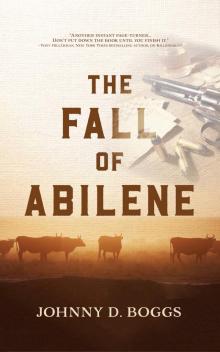 The Fall of Abilene
The Fall of Abilene A Thousand Texas Longhorns
A Thousand Texas Longhorns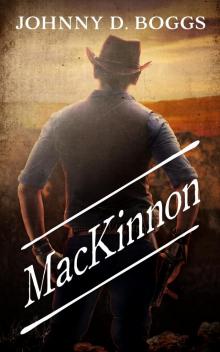 MacKinnon
MacKinnon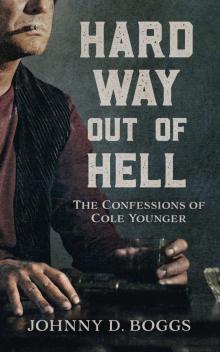 Hard Way Out of Hell
Hard Way Out of Hell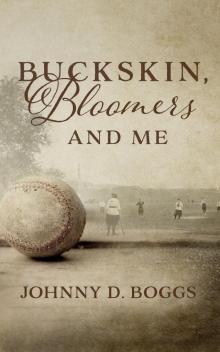 Buckskin, Bloomers, and Me
Buckskin, Bloomers, and Me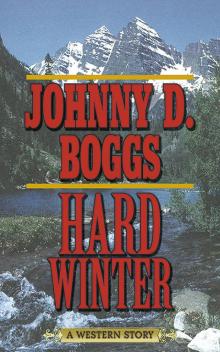 Hard Winter
Hard Winter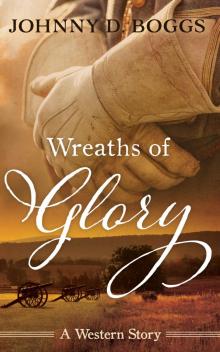 Wreaths of Glory
Wreaths of Glory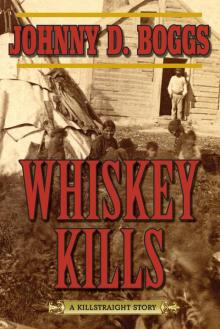 Whiskey Kills
Whiskey Kills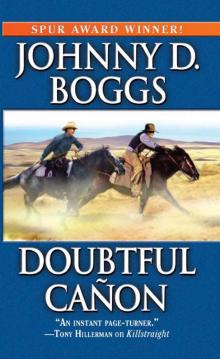 Doubtful Canon
Doubtful Canon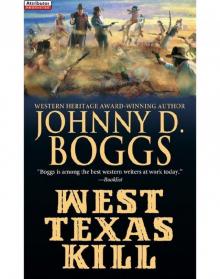 West Texas Kill
West Texas Kill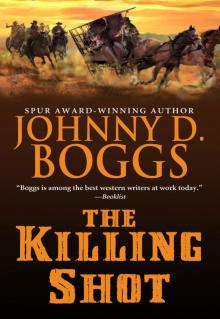 The Killing Shot
The Killing Shot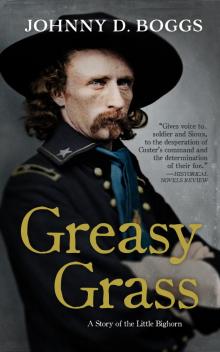 Greasy Grass
Greasy Grass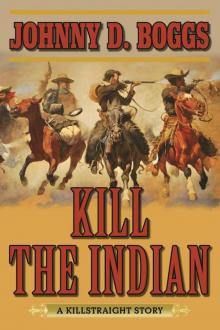 Kill the Indian
Kill the Indian Return to Red River
Return to Red River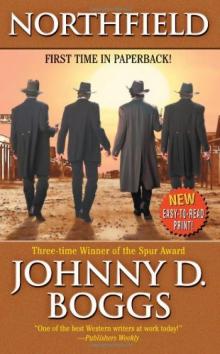 Northfield
Northfield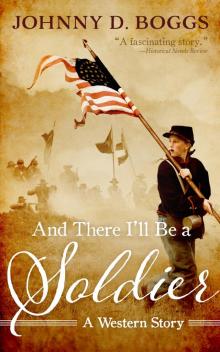 And There I’ll Be a Soldier
And There I’ll Be a Soldier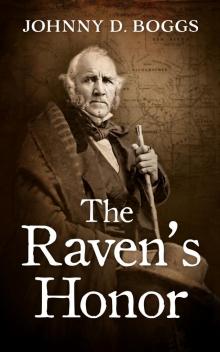 The Raven's Honor
The Raven's Honor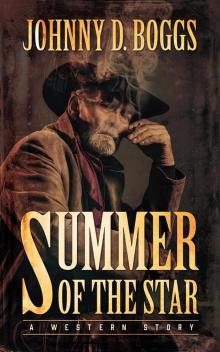 Summer of the Star
Summer of the Star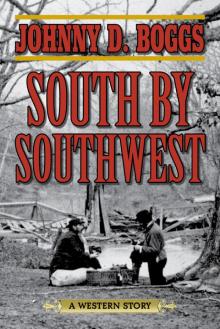 South by Southwest
South by Southwest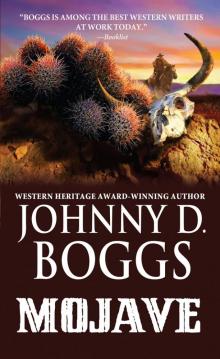 Mojave
Mojave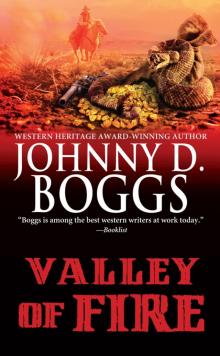 Valley of Fire
Valley of Fire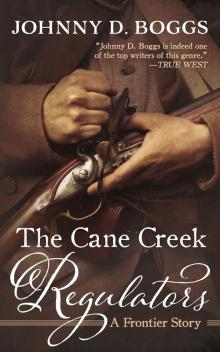 The Cane Creek Regulators
The Cane Creek Regulators